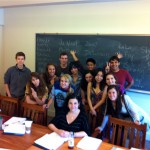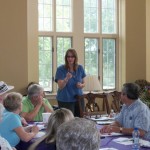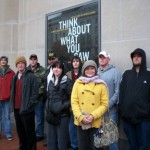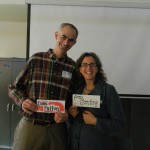Reflection – Second time around 2023
Forums › 2023 Summer Seminar › On Austrian Soil 2023 Summer Seminar Responses: due MAY 30 › Reflection – Second time around 2023
-
AuthorPosts
-
-
May 24, 2023 at 5:35 pm #31717
As I have been rereading On Austrian Soil, I actually dove back into my initial responses on the discussion forum from 2020. It is funny to look back at where my head was at as we were all staying home and isolating and how my thoughts have both stayed the same and changed since then.
One thing that I noticed and something that stood out to me this time around as well, is this idea of what should and can be discussed in the classroom. I think of the bravery (because that is what it is) of the educators that Sondra worked with to openly discuss history that was difficult and build relationships and open dialogue in spite of the past. I got stuck again on the line from Martina where she talked about being morally neutral and then how the educators push back against that in their actions. I feel even stronger now than I did in 2020 about giving students opportunities to talk about hard things. This has become increasingly harder in NH, as we have our divisive concepts law that has made people feel that they have to be neutral in all that they teach and discuss.
I think my biggest takeaway from Sondra’s story is really the idea of brave and honest teaching and the importance of that. We want our students to be brave and honest. We want them to take risks and discuss hard truths. We want them to find the truth in our world. In order to do this, we need to model this in our own classrooms and offices. What does it look like to put yourself in a position where the result could go badly? What does a safe environment look like? These are the questions that Sondra brings to my mind and reaffirms the importance of creating a safe space where students can be brave.
-
May 25, 2023 at 12:29 pm #31721
Thank you, Ashley, I too was inspired by the bravery aspect the first time I read this book. It is a good reminder for me that being vulnerable can pay in dividends – where there is great risk there is also great reward. Sondra’s book helps embolden me to take those risks, and it does seem like the risks are even more risky in today’s society.
-
May 31, 2023 at 7:36 am #31756
Dear Ashley,
Thank you for your reflections. I agree with you, especially that in our work very important is creating a safe space where students can be brave. Today in Poland we have challenges related to populism and propaganda. Sexual minorities, for example, are discriminated against – I will be talking about this in New York,
all the best
Jakub
-
-
May 29, 2023 at 9:09 am #31727
Ashley, You defintely capture the essence of Sondra’s work in this book. I think you have an even harder task where you are, but I can generalise that we are going to face similar channges in other states. It is increasingly becoming clear to me that the eduaction system will become front and center of the culture wars.
-
May 30, 2023 at 5:27 pm #31755
Ashley,
I couldn’t agree more. It is imperative that we give students a space to learn and grow – to be critically thinking humans. This has also become increasingly risky in Montana as people continue to push for the censorship of teachers and curriculum. If we don’t make the space for this, though, who will? -
June 10, 2023 at 5:41 pm #31807
I agree with all of you that the time we are living in right now is so full of polarization and fear that ‘speaking truth to power; is becoming very risky. I hope our coming together as a community can help provide the strength and courage required to take the risks. Til soon….
-
June 13, 2023 at 12:01 am #31828
Ashley,
I empathize with the divisive concepts law. It seems to me that any law meant to stifle open discussion is inherently undemocratic. I am fortunately teaching in a state so blue that we are adding mandates to teach about Native History/Shared History, Holocaust and Human Rights education, and Ethnic Studies. Unfortunately, I teach in a conservative county 30 miles outside of Portland, so many of these mandates have not gone into effect yet.Sometimes I remind myself that censorship laws primarily reflect fear of change. Perhaps our version of risk-taking will simply be to continue to teach empathy and empower young people to learn, adapt, and change. If each of us takes a step, then we can move a lot of minds.
Jeremy
-
-
AuthorPosts
- You must be logged in to reply to this topic.
Recent Replies
Recently Active
-
Active 3 days, 15 hours ago
-
Active 3 days, 16 hours ago
-
Active 6 days, 16 hours ago
-
Active 1 week ago
-
Active 1 week ago
- View All Members






